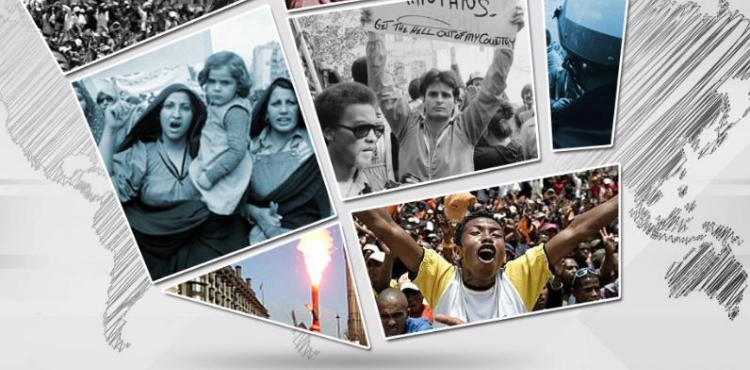From Chile to Hong Kong, passing through Algeria, Lebanon, France and other countries, angry citizens took to the streets in 2019 in the absence of leaders directing their action, in a scene resembling the battle of the "disgruntled" at the beginning Decimals against political systems, elites and inequality.
Thousands of citizens took to the streets, denouncing common suffering in Baghdad, Beirut, La Paz and elsewhere, and toppling five officials between heads of state and government. Among them were demonstrators who transformed their bodies in the form of the hero of "V for Vandita" or the hero of the film Joker, who feels marginalized and not taken seriously.
Karim Bitar, director of the Institute of Political Science at Beirut´s St. Joseph University, said they led a "revolution on Tina," referring to former British Prime Minister Margaret Thatcher´s phrase "There is no alternative". .
At a million-dollar demonstration in Chile at the end of October, 51-year-old teacher Marcela Paz replied that "society can no longer afford to pay more. They pulled the noose down and it had to end in collapse."
Olivier Villiol, a social movements researcher at the Institute of Political Studies in Lausanne, Switzerland, shares the fact that they are building their movements "horizontally without leaders, organization or structure at first."
The ignition may be mismatched here and there, such as a Hong Kong deportation bill, a hike in metro cards in Santiago, Chile, or a tax on whatsapp in Lebanon, but the flame was raising storms all over.
But the suffering seems similar. “From Lebanon to Iraq, our suffering is the same,” was a sign written on a banner in Beirut in front of the EDL headquarters, one of the symbols of the country´s utilities.
The Internet and social networks have contributed to the movement more than in 2011, especially as the number of users globally has more than doubled in 10 years, reaching 4.5 billion users.
In Algeria, the networks played a "very important role," he told AFP at the beginning of the year, Oqba Bel Abbes, one of 25 people who founded a youth gathering. "Words are moving faster than before."
In Hong Kong or Barcelona, ​​protesters pass messages between themselves through secure applications, including specially launched applications that cannot be downloaded without "code and QR".
In Iran, Iraq or even Egypt, the authorities have sought to curb unrest by cutting off the Internet, but without successes over time.
Jeffrey Blairs, a sociologist at the Catholic University of Louvain in Belgium and at the School of International Studies in Paris, explains that this does not reduce what is going on as Facebook revolutions.
It is about deep-rooted movements in which young people play a leading role, but at the same time transcend generational divisions. Older people could dominate the "yellow jackets" movement in France, while Chile´s movements include a large number of retirees, or include all age groups such as Barcelona or Bolivia, according to Blairs.
In essence, slogans and slogans reflect the lack of confidence of the demonstrators in the economic system, which is no longer a factor for social upgrading, and the lack of confidence in a democracy that does not exist or is deaf to citizens´ complaints.
"As far as my city is concerned, I want a government that can help the citizens or the middle classes, and a government that seriously talks with its citizens," said a Hong Kong protester.
Researchers questioned by AFP believe that these protests are rooted in uprisings and movements known as the beginning of the decade, such as the Arab Spring, which began in Tunisia at the end of 2010, or the "Occupy Wall Street" movement in September 2011 to protest austerity and violations of capitalism. Finance.
Olivier Féliol believes that `` 2019 looks like a year of protest action par excellence ´´, but understands that this is ´not unprecedented or exceptional´.
`` We recall that at the end of 2011, Time magazine chose the protester to be the character of the year. 2019´s actions fall within the same historical sequence. ´´
"The economic imbalances revealed by the 2008 crisis have moved from the elites to the weakest through austerity, unemployment and insecurity," explains Jack Fernner, a professor at the University of Chicago.
Eric Nouveau, a sociologist at the Institute of Political Science in the French city of Rennes, argues that in terms of democracies, "the belief that democracy can change lives is inevitably dissipated."
In the midst of this, he says, the people believe that his "salvation in protest movements", and perhaps in the heart of the regimes.
Karim Bitar, for his part, says it is also "revolutions for dignity."
In a few weeks, these moves resulted in the departure of the presidents of Algeria, Abdelaziz Bouteflika and Sudan´s Omar al-Bashir, as well as the resignation of Bolivian President Evo Morales, Lebanese Prime Minister Saad Hariri and his Iraqi counterpart Adel Abdel Mahdi.
In Hong Kong, the Deportation of Most Wanted to China bill, which it said would work to "improve" the selection of the head of the executive branch, was a major demand for demonstrators demanding democratic reforms.
However, repression has been severe in a number of places, particularly in Iran, where Amnesty International has reported 208 deaths since mid-November.
Bitar believes that "anger may not necessarily back down" in 2020, while warning that "those who have benefited from the political system will not give up easily."












